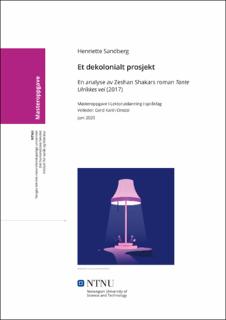| dc.contributor.advisor | Omdal, Gerd Karin | |
| dc.contributor.author | Sandberg, Henriette | |
| dc.date.accessioned | 2021-09-24T18:32:17Z | |
| dc.date.available | 2021-09-24T18:32:17Z | |
| dc.date.issued | 2020 | |
| dc.identifier | no.ntnu:inspera:54845176:20647049 | |
| dc.identifier.uri | https://hdl.handle.net/11250/2781869 | |
| dc.description.abstract | Sammendrag
Denne oppgaven har til hensikt å vise hvordan romanen Tante Ulrikkes vei fungerer som et dekolonialt prosjekt. På et overordnet nivå dreier dekolonialitet seg om å belyse, stille spørsmål ved og kritisere de koloniale strukturer som fortsatt styrer og preger vår verden. Dekolonialitet er et relativt nytt felt innen skandinavisk litteraturvitenskap og er et felt som er i utvikling i takt med utgivelser fra den nye flerkulturelle generasjonen forfattere i Skandinavia. I denne oppgaven vil jeg i hovedsak støtte meg til Walter Mignolos tekster om kolonialitet og dekolonialitet.
Analysen tar utgangspunkt i tre analysepunkter: tema, form og språk. Analysen undersøker hvordan de tema som presenteres i romanen henspiller på dekolonialitet, og hvordan romanens form og språk bygger opp under det dekoloniale perspektivet i romanen. Mignolos modell av den koloniale maktmatrisen er benyttet i analysen for å poengtere hvordan dekolonialitet tematiseres i romanen. Hvordan romanen viker fra de nåværende kategorier som skandinavisk flerkulturell litteratur ofte kategoriseres ut fra er også med på å belyse dekolonialitet, i tillegg til å belyse de koloniale mønstre innen litteraturvitenskapen.
Min lesning av Tante Ulrikkes vei kartlegger hvordan protagonistene i romanen preges og begrenses av, og til dels er en del av, et kolonialt system. Sentralt i analysen er det å påpeke hvordan romanen stiller spørsmål ved og bryter med de koloniale mønstrene. Det er gjennom disse kritiske spørsmålene om konstellasjoner i den moderne verden og brytningene med mønstrene at romanen er et dekolonialt prosjekt. | |
| dc.description.abstract | Summary
This thesis aims to show how the novel Tante Ulrikkes vei functions as a decolonial project. At a general level, decoloniality sheds light and ask questions about colonial structures that still rule and shape our world. Decoloniality is a relatively new field within Scandinavian literary science and is a field that evolves in tandem with the new multicultural generation of writers. In this thesis I will mainly rely on Walter Mignolos works about coloniality and decoloniality.
The analysis is based on three points of analysis: theme, form and language. The analysis examines how the themes presented in the novel refer to decoloniality, and how the novels form and language points to decoloniality. Mignolos model of the colonial matrix power will be used in the analysis to point out how decoloniality is represented in the themes in the novel. How the novel diverges from the current categories that Scandinavian multicultural literature often is categorized by, also sheds light on the decoloniality, as well as to point out the colonial patterns in the literary science.
My reading of Tante Ulrikkes vei maps how the protagonists in the novel are shaped and limited by, and in some ways are part of, the colonial system. An important aspect of the analysis is to point out how the novel questions and breaks with the colonial patterns. It is through these critical questions about constellations in the modern world and how the novel breaks with the patterns, that the novel is a decolonial project. | |
| dc.language | | |
| dc.publisher | NTNU | |
| dc.title | Et dekolonialt prosjekt | |
| dc.type | Master thesis | |
